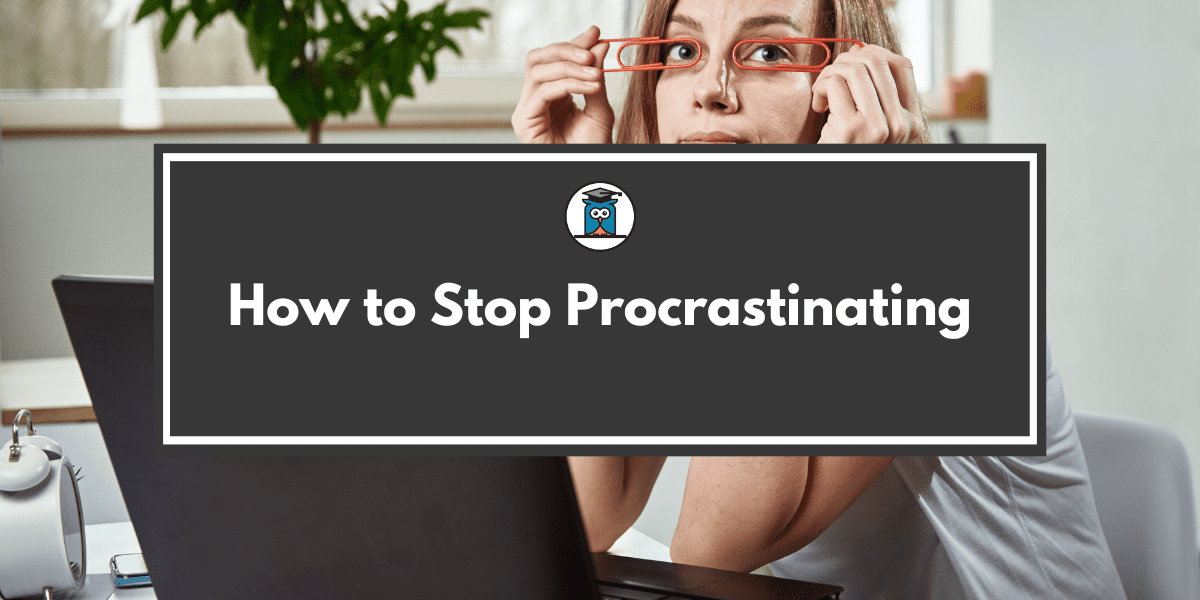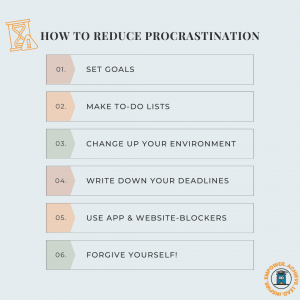Author: Tiffany W.
If you’re anything like me, fighting procrastination is a never-ending uphill battle—an almost Sisyphean task. It’s far too easy to pick up my phone and scroll through social media. Or, wander into the kitchen to get a snack.
There are a variety of reasons people procrastinate—poor study habits, avoiding unpleasant emotions, and more. The first step to learning how to stop procrastinating is figuring out the cause. When you understand why you procrastinate, you can target the specific causes to minimize moments when you might be likely to procrastinate.
1. Assess your habits.
The most common assumption and prevailing theory is that procrastinators don’t have any discipline and would rather choose fun activities and relaxation over hard work. But students are working. Even if we didn’t factor in the 6-8 hours of school, many students have a variety of extracurriculars: volunteering, additional coursework, sports, music, and work.
Procrastinating is not an indication of lacking the will to work—rather, it’s indicative of lacking sufficient systems and good study habits.
To figure out if you need a better system, ask yourself the following questions:
- Do I have a system in place that helps me tackle my most important assignments, like projects, papers, and studying for exams?
- Am I allowing deadlines and work to dictate my schedule, or am I choosing where and when to use my time and energy?
To help yourself build better habits and systems, try setting aside a specific time for a project or assignment every day. Set a timer for as many minutes as you’re able to concentrate, even if it’s only for five at a time. Slowly lengthen that period each day, until you’re working for an hour or longer if needed.
Furthermore, it’s important to work at the same time each day if you can, so that the task becomes habitual. Then, it’ll be easier to get started.
Strategically Craft Work Sessions
It can also be helpful to work when you’re most alert. For example, if you know that you’re more of a night owl, schedule thirty minutes to an hour each night to work on that history paper.
If you’re a morning person, it can be harder to schedule personal study time, as school often gets in the way. As a morning person, myself, I decided to go to sleep earlier and wake up at 5 a.m. during high school so that I could squeeze in a couple hours of steady work before school started.
For larger tasks, like papers, try to reverse engineer your schedule. Work backwards from the deadline and set personal deadlines for your outline, draft, edits, and final piece. This can be tricky, because teachers tend to offer more time for long-term projects (ergo, more time to procrastinate). One way I tackle this is by shifting my mindset: what can I do now that my future self will appreciate?
2. Assess your emotions.
Often, I don’t put off a task because it’s impossible, or The Hardest Task. And this is because the task causes me to feel a certain way, dredging up unpleasant emotions. Perhaps you have a vendetta against Calculus (I certainly do!) or hate Hamlet down to the core. Maybe statistics is a snooze. Whether the assignment invokes feelings of stress, anxiety, boredom, or disgust, the resulting consequence is still the same: you end up feeling overwhelmed, annoyed, or uncertain. And in this state, even the simplest of tasks can feel Herculean.
To figure out if your emotions are causing you to procrastinate, ask yourself these questions:
- How is my mental health?
- What emotions do my homework and school assignments evoke in me? Do they make me feel frustrated, bored, resentful, or overwhelmed?
Sometimes you do need to take a moment to rest and take care of your body and mind! If you find that your negative emotions get in the way of tackling homework assignments, stop to rate how much they are affecting your performance on a scale of 1-10. From there, you can try tackling each emotion.
Start small
If a task makes you anxious, start small. Start a PowerPoint deck, scribble out some general thoughts about a book, or do the easiest problem on the page. If it makes you bored, time yourself, creating just enough pressure to require your full attention to complete the task in the time given without being too stressed. If it makes you resentful or frustrated, try to find any elements that you do appreciate. Or, break up the task by squeezing it in between other tasks that are less frustrating.
3. Grab a buddy.
Building habits is hard! It takes consistency and perseverance, and can be particularly difficult if you’re doing it alone. Something I found to be especially helpful—and still do it in graduate school—is working with a friend. Structuring partnered work time based on your needs can be extremely effective for amping up your productivity.
For instance, my friend and I will meet (at a previously agreed upon time) at a coffee shop to grab a caffeinated to-go drink. From there, we’ll head to either the library, practice rooms, or other quiet areas for work. During set-up and prior to work, we share our goals for the work session. Perhaps I want to finish learning a piece, or start an article draft, or answer emails I’ve been putting off. Then we work! Afterwards, we’ll discuss what we accomplished and what we still need to work on. 
Grabbing a drink prior to starting is a good “start” signal for my mind. I know that once I’ve got that beverage, the next few hours after will be a time for steady focus. If you don’t like caffeinated drinks or don’t want to spend money, you can use different “start” markers. Some other “start signals” I use:
- Lighting a candle
- Putting on lo-fi music
- Wearing certain clothes
- Sitting at a location designated strictly for work
Exchange goals
Exchanging goals before working is crucial. It allows you to verbalize what you want to complete, and applies just the tiniest bit of pressure, holding you to some accountability. You’d be surprised at how much more efficient we are when the end is at least somewhat in sight!
Debrief
The debrief at the end serves as my personal “end” marker. That signals to my brain that the focus period has ended. Verbalizing my accomplishments and incomplete tasks also helps me understand exactly what I did, and what I still need to do.
There are numerous reasons why people procrastinate, but they rarely point to a flaw in a student’s character or discipline. Instead, they point to a need for structure, good habits, and good health. With time and practice, these methods can help you minimize procrastination. And, they can enable you to develop good habits throughout your academic career and beyond.
Tiffany W. is a tutor at My Private Professor, which provides individualized online & in-person tutoring to students in all subjects, including K-12 math, science, language arts, history, foreign language, AP exams, test prep, essays, & college counseling, by top tutors from top universities. www.myprivateprofessor.com
Companies like My Private Professor(MPP), based in Orange County, California, offer exceptional in-person and online tutoring resources to help you stay on top of your schoolwork. Get in touch with an MPP tutor to improve your academic confidence and study skills, and work towards achieving your goals!








